Comprehensive Guide to Garden Maintenance in Bermondsey
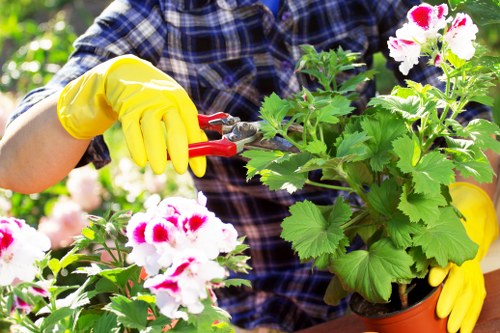
Introduction to Garden Maintenance
Maintaining a beautiful garden in Bermondsey requires dedication, knowledge, and the right tools. Whether you're a seasoned gardener or a novice, understanding the nuances of garden care in this vibrant London locale can transform your outdoor space into a serene oasis.
Bermondsey's unique climate and urban setting present both opportunities and challenges for garden enthusiasts. From selecting the right plants to implementing effective maintenance routines, every aspect plays a crucial role in the health and aesthetics of your garden.
In this guide, we'll explore essential garden maintenance tips tailored specifically for Bermondsey, ensuring your garden thrives throughout the year.
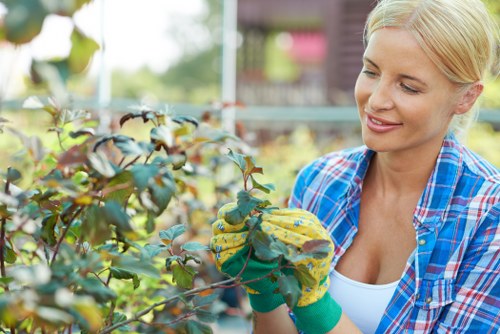
Understanding Bermondsey’s Climate
Weather Patterns
Bermondsey experiences a temperate maritime climate, characterized by mild winters and warm summers. This climate is conducive to a wide variety of plants, but it's essential to consider seasonal variations when planning your garden maintenance schedule.
Rainfall is distributed fairly evenly throughout the year, but late spring and early autumn may bring heavier showers. Understanding these patterns helps in choosing the right plants and scheduling irrigation systems effectively.
Additionally, Bermondsey can occasionally experience frost during the winter months, which necessitates the selection of frost-resistant plants and protective measures for more delicate species.
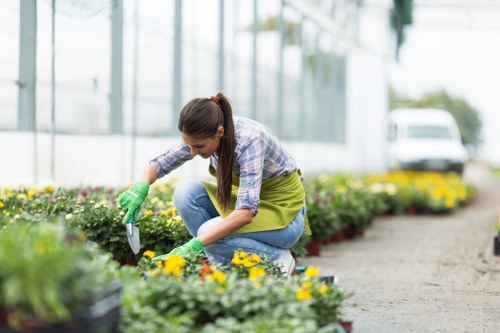
Choosing the Right Plants
Native and Adapted Species
Selecting plants that thrive in Bermondsey’s climate reduces maintenance efforts and ensures a resilient garden. Native species are often more tolerant of local pests and diseases, requiring less chemical intervention and care.
Consider plants like lavender, which not only add fragrance and color but also attract pollinators essential for a healthy ecosystem. Other excellent choices include English ivy, boxwood shrubs, and rose varieties adapted to urban environments.
Incorporating a mix of perennials and annuals can provide continuous blooms and greenery, enhancing the garden's visual appeal across different seasons.
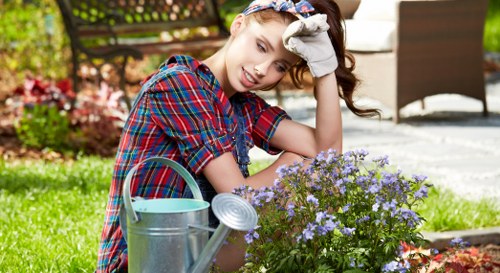
Essential Garden Maintenance Practices
Pruning and Trimming
Regular pruning is vital for the health and appearance of your garden. It encourages new growth, removes dead or diseased branches, and shapes plants to maintain their desired form.
Spring is an ideal time for pruning most shrubs and trees, allowing them to recover and flourish during the growing season. However, specific plants may have unique pruning requirements, so it's essential to research or consult with a gardening expert.
Tools Needed for Effective Pruning
- Sharp pruning shears
- Pruning saw
- Loppers
- Protective gloves
Maintaining Lawn Health
A well-maintained lawn forms the backbone of many Bermondsey gardens. Regular mowing, watering, and fertilizing keep the grass lush and resilient against wear and tear.
Avoid cutting the grass too short to promote healthy root development and reduce weed growth. Aerating the lawn annually can also improve soil health and drainage.
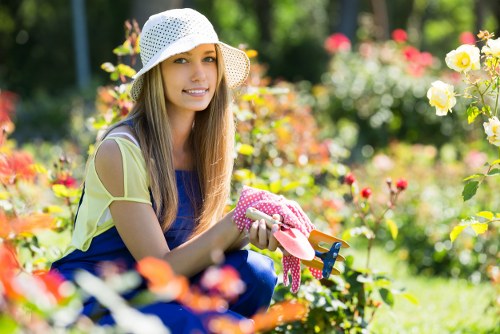
Watering and Irrigation Strategies
Efficient Water Use
Water conservation is crucial in urban gardens. Implementing efficient watering systems such as drip irrigation or rainwater harvesting can significantly reduce water usage while ensuring your plants receive adequate moisture.
Early morning watering minimizes evaporation and allows plants to absorb water effectively throughout the day. Additionally, grouping plants with similar water needs can optimize irrigation efforts.
Rainwater Harvesting
Collecting and storing rainwater provides a sustainable water source for your garden. Install rain barrels or cisterns to capture runoff from roof gutters, which can then be used during dry periods.
Organic Fertilization
Using organic fertilizers enhances soil health and promotes robust plant growth. Composting kitchen scraps and garden waste creates a nutrient-rich amendment that improves soil structure and fertility.
Pest and Disease Management
Integrated Pest Management (IPM)
Managing pests and diseases in your Bermondsey garden requires a proactive and environmentally friendly approach. Integrated Pest Management (IPM) combines biological, cultural, and chemical methods to control pests with minimal impact on beneficial organisms.
Encourage natural predators like ladybugs and birds to keep pest populations in check. Regularly inspect plants for signs of infestation and address issues promptly to prevent widespread damage.
Natural Remedies
Utilize natural remedies such as neem oil, insecticidal soaps, and homemade sprays to tackle common garden pests. These solutions are less harmful to the environment and safer for humans and pets.
Preventative Measures
Maintaining plant health through proper watering, fertilization, and spacing reduces susceptibility to diseases. Rotate crops annually to disrupt pest life cycles and prevent soil-borne illnesses.
Seasonal Maintenance Tips
Spring Care
Spring is the time for rejuvenating your garden after the winter months. Clear out debris, prune dead branches, and prepare the soil for new growth.
Planting early-blooming flowers and vegetables ensures a vibrant and productive garden throughout the season. Apply a balanced fertilizer to support plant development and resilience.
Summer Strategies
During the warm summer months, focus on maintaining consistent watering schedules and providing shade for plants that may be susceptible to heat stress.
Autumn Preparation
As temperatures begin to drop, transition your garden by planting hardy perennials and preparing beds for winter. Mulching helps insulate the soil and protect root systems from frost.
Tools and Equipment for Garden Maintenance
Essential Gardening Tools
Having the right tools is fundamental to effective garden maintenance. Invest in high-quality equipment such as:
- Garden gloves for protection
- Hand trowels and spades for planting
- Pruning shears and saws for trimming
- Wheelbarrows for transporting materials
Storage Solutions
Organize your tools in a dedicated shed or storage area to keep them in good condition and easily accessible when needed. Regular cleaning and maintenance of tools extend their lifespan and effectiveness.
Modern Gardening Innovations
Embrace modern gardening innovations such as battery-powered tools, smart irrigation systems, and eco-friendly fertilizers to enhance your maintenance routine and reduce manual labor.
Professional Garden Maintenance Services
Benefits of Hiring Professionals
While DIY garden maintenance is achievable, hiring professionals in Bermondsey offers numerous advantages. Experienced gardeners bring expertise, efficiency, and a fresh perspective to your outdoor space.
Professional services can handle complex tasks like landscape design, soil testing, and large-scale pruning, ensuring your garden remains in optimal condition year-round.
Choosing the Right Service
When selecting a garden maintenance service, consider factors such as experience, customer reviews, and the range of services offered. A reputable company will tailor their approach to meet your specific garden needs.
Cost Considerations
Investing in professional maintenance can save time and reduce the risk of costly mistakes. Compare quotes and service packages to find a solution that fits your budget without compromising quality.
Sustainable Garden Practices
Eco-Friendly Gardening
Adopting sustainable practices in your Bermondsey garden not only benefits the environment but also enhances the health of your plants. Techniques such as composting, mulching, and using organic fertilizers promote soil vitality and reduce waste.
Incorporate native plants that require less water and are more resilient against local pests. Utilizing recycled materials for garden structures and pathways also contributes to a greener garden.
Water Conservation
Implement water-saving techniques like drip irrigation, rainwater harvesting, and selecting drought-tolerant plants to minimize water usage and maintain a sustainable garden.
Wildlife-Friendly Gardens
Create habitats for beneficial wildlife by including birdhouses, insect hotels, and diverse plant species. A thriving ecosystem supports pollinators and natural pest control, enhancing the overall health of your garden.
DIY Garden Maintenance Tips
Simple Maintenance Hacks
Maintaining your Bermondsey garden doesn't have to be overwhelming. Implementing simple hacks can streamline your routine and keep your garden looking its best.
- Mulch regularly to retain moisture and suppress weeds.
- Use companion planting to naturally deter pests and enhance growth.
- Regularly inspect plants for early signs of pests or diseases.
Time Management
Organize your maintenance tasks by creating a seasonal schedule. Allocate specific days for tasks like pruning, weeding, and fertilizing to ensure consistency and efficiency.
Personalizing Your Garden
Incorporate personal touches such as decorative stones, garden art, or custom seating areas to make your garden uniquely yours. These elements add character and make maintenance more enjoyable.
Common Gardening Challenges in Bermondsey
Urban Environment Issues
Urban gardens in Bermondsey face unique challenges such as limited space, pollution, and restricted sunlight. Overcoming these hurdles requires creative solutions like vertical gardening, using raised beds, and selecting shade-tolerant plants.
Soil Quality
Urban soil can be compacted and nutrient-poor. Improve soil quality by incorporating organic matter, practicing crop rotation, and using soil amendments to create a fertile environment for plant growth.
Pest Control in Urban Settings
Managing pests in an urban garden requires vigilance and sustainable methods. Implement barriers, use non-toxic repellents, and encourage beneficial insects to maintain a balanced ecosystem.
Enhancing Garden Aesthetics
Landscaping Ideas
Thoughtful landscaping enhances the beauty and functionality of your garden. Incorporate elements like pathways, water features, and seating areas to create a harmonious and inviting space.
Color Coordination
Select plants with complementary colors to create visually appealing displays. Combining various textures and hues adds depth and interest to your garden design.
Lighting for Ambiance
Outdoor lighting accentuates garden features and extends the usability of your space into the evening. Use solar-powered lights or energy-efficient LEDs to illuminate paths and highlight focal points.
Conclusion
Achieving a Thriving Bermondsey Garden
Proper garden maintenance in Bermondsey involves a blend of knowledge, practice, and creativity. By understanding the local climate, choosing the right plants, and implementing sustainable practices, you can cultivate a garden that not only looks stunning but also supports a healthy ecosystem.
Whether you opt for DIY maintenance or enlist professional services, the key is consistency and attention to detail. Embrace the beauty of Bermondsey's urban landscape and create a garden that reflects your personal style and commitment to nature.
Ready to transform your Bermondsey garden? Contact us today to book your garden maintenance service and enjoy a lush, vibrant outdoor space all year round!